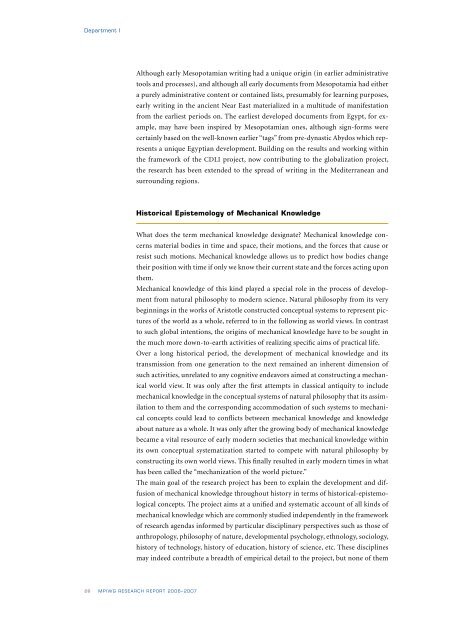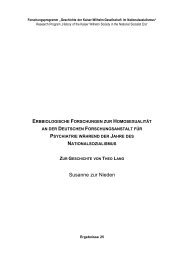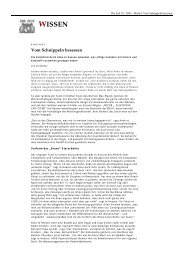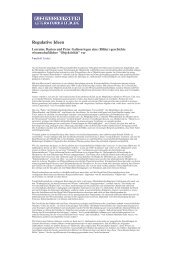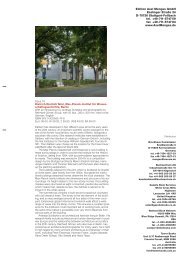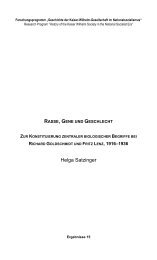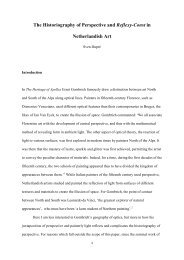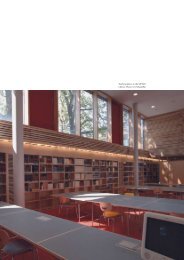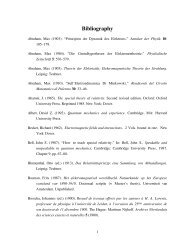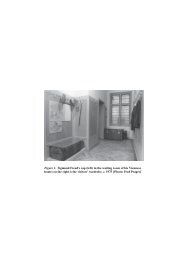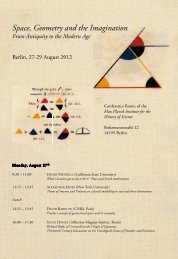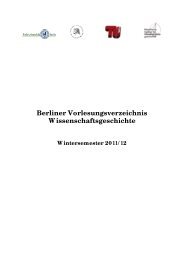Max Planck Institute for the History of Science
Max Planck Institute for the History of Science
Max Planck Institute for the History of Science
Create successful ePaper yourself
Turn your PDF publications into a flip-book with our unique Google optimized e-Paper software.
Department I<br />
Although early Mesopotamian writing had a unique origin (in earlier administrative<br />
tools and processes), and although all early documents from Mesopotamia had ei<strong>the</strong>r<br />
a purely administrative content or contained lists, presumably <strong>for</strong> learning purposes,<br />
early writing in <strong>the</strong> ancient Near East materialized in a multitude <strong>of</strong> manifestation<br />
from <strong>the</strong> earliest periods on. The earliest developed documents from Egypt, <strong>for</strong> ex-<br />
ample, may have been inspired by Mesopotamian ones, although sign-<strong>for</strong>ms were<br />
certainly based on <strong>the</strong> well-known earlier “tags” from pre-dynastic Abydos which rep-<br />
resents a unique Egyptian development. Building on <strong>the</strong> results and working within<br />
<strong>the</strong> framework <strong>of</strong> <strong>the</strong> CDLI project, now contributing to <strong>the</strong> globalization project,<br />
<strong>the</strong> research has been extended to <strong>the</strong> spread <strong>of</strong> writing in <strong>the</strong> Mediterranean and<br />
surrounding regions.<br />
Historical Epistemology <strong>of</strong> Mechanical Knowledge<br />
What does <strong>the</strong> term mechanical knowledge designate? Mechanical knowledge con-<br />
cerns material bodies in time and space, <strong>the</strong>ir motions, and <strong>the</strong> <strong>for</strong>ces that cause or<br />
resist such motions. Mechanical knowledge allows us to predict how bodies change<br />
<strong>the</strong>ir position with time if only we know <strong>the</strong>ir current state and <strong>the</strong> <strong>for</strong>ces acting upon<br />
<strong>the</strong>m.<br />
Mechanical knowledge <strong>of</strong> this kind played a special role in <strong>the</strong> process <strong>of</strong> develop-<br />
ment from natural philosophy to modern science. Natural philosophy from its very<br />
beginnings in <strong>the</strong> works <strong>of</strong> Aristotle constructed conceptual systems to represent pic-<br />
tures <strong>of</strong> <strong>the</strong> world as a whole, referred to in <strong>the</strong> following as world views. In contrast<br />
to such global intentions, <strong>the</strong> origins <strong>of</strong> mechanical knowledge have to be sought in<br />
<strong>the</strong> much more down-to-earth activities <strong>of</strong> realizing specific aims <strong>of</strong> practical life.<br />
Over a long historical period, <strong>the</strong> development <strong>of</strong> mechanical knowledge and its<br />
transmission from one generation to <strong>the</strong> next remained an inherent dimension <strong>of</strong><br />
such activities, unrelated to any cognitive endeavors aimed at constructing a mechan-<br />
ical world view. It was only after <strong>the</strong> first attempts in classical antiquity to include<br />
mechanical knowledge in <strong>the</strong> conceptual systems <strong>of</strong> natural philosophy that its assim-<br />
ilation to <strong>the</strong>m and <strong>the</strong> corresponding accommodation <strong>of</strong> such systems to mechani-<br />
cal concepts could lead to conflicts between mechanical knowledge and knowledge<br />
about nature as a whole. It was only after <strong>the</strong> growing body <strong>of</strong> mechanical knowledge<br />
became a vital resource <strong>of</strong> early modern societies that mechanical knowledge within<br />
its own conceptual systematization started to compete with natural philosophy by<br />
constructing its own world views. This finally resulted in early modern times in what<br />
has been called <strong>the</strong> “mechanization <strong>of</strong> <strong>the</strong> world picture.”<br />
The main goal <strong>of</strong> <strong>the</strong> research project has been to explain <strong>the</strong> development and dif-<br />
fusion <strong>of</strong> mechanical knowledge throughout history in terms <strong>of</strong> historical-epistemo-<br />
logical concepts. The project aims at a unified and systematic account <strong>of</strong> all kinds <strong>of</strong><br />
mechanical knowledge which are commonly studied independently in <strong>the</strong> framework<br />
<strong>of</strong> research agendas in<strong>for</strong>med by particular disciplinary perspectives such as those <strong>of</strong><br />
anthropology, philosophy <strong>of</strong> nature, developmental psychology, ethnology, sociology,<br />
history <strong>of</strong> technology, history <strong>of</strong> education, history <strong>of</strong> science, etc. These disciplines<br />
may indeed contribute a breadth <strong>of</strong> empirical detail to <strong>the</strong> project, but none <strong>of</strong> <strong>the</strong>m<br />
26 MPIWG ReseaRch RePoRt 2006– 2007


